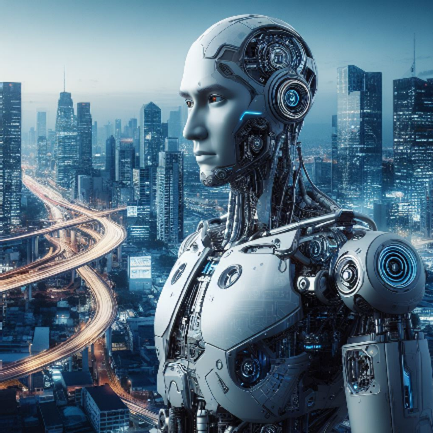In the ever-evolving landscape of digital marketing, one force stands out for its transformative impact: Artificial Intelligence (AI). What was once limited to sci-fi is now deeply embedded in every facet of digital strategy—from audience segmentation and content creation to predictive analytics and automated customer engagement.
As brands battle for attention in a crowded marketplace, AI isn’t just a luxury—it’s becoming a necessity. In this in-depth guide, we’ll explore how AI is revolutionizing digital marketing, backed by real-world examples, practical applications, and a look into what the future holds.
What is AI in Digital Marketing?
Artificial Intelligence refers to a set of technologies—such as machine learning, natural language processing, and deep learning—that enable machines to mimic human intelligence. In digital marketing, AI is used to analyze data, make decisions, automate processes, and even interact with users.
Key AI technologies in marketing include:
- Machine Learning (ML): Algorithms that learn from data to improve outcomes.
- Natural Language Processing (NLP): Used for voice assistants, chatbots, and content generation.
- Computer Vision: Enables AI to “see” and understand visual content.
- Predictive Analytics: Anticipates future behavior based on historical data.
Why AI Matters in Digital Marketing
With user data increasing exponentially, marketers can no longer rely solely on human analysis and manual execution. AI helps:
- Unlock deeper insights into customer behavior.
- Deliver hyper-personalized experiences at scale.
- Automate repetitive and time-consuming tasks.
- Increase campaign effectiveness and ROI.
According to Statista, global spending on AI in marketing is projected to reach over $100 billion by 2030.
Top Applications of AI in Digital Marketing
1. Hyper-Personalization at Scale
Modern customers expect tailored experiences. AI makes this possible by analyzing:
- Browsing history
- Purchase behavior
- Device usage
- Social media interactions
This allows marketers to dynamically personalize emails, web content, ads, and product recommendations.
Example: Amazon uses AI to analyze purchase behavior and deliver personalized shopping experiences that account for nearly 35% of its sales.
2. Predictive Analytics and Lead Scoring
AI helps brands move from reactive to proactive marketing. With predictive analytics, businesses can:
- Forecast demand trends
- Identify churn risks
- Optimize pricing
- Score leads for sales-readiness
HubSpot, for instance, incorporates AI to prioritize leads, helping sales teams focus on the prospects most likely to convert.
3. Chatbots and Virtual Assistants

AI chatbots offer:
- 24/7 customer support
- Multilingual interaction
- Fast response time
- Consistent brand tone
These bots use NLP and ML to learn from interactions and improve over time.
Tools like Drift and LivePerson have helped brands reduce support costs and improve lead conversion by as much as 40%.
4. AI-Powered Ad Targeting
Programmatic advertising uses AI to automate the buying and placement of ads in real-time. It:
- Targets the right audience at the right time
- Adjusts ad bids dynamically
- Reduces wasted ad spend
Platforms like Google Ads and Facebook Ads now use AI to power Smart Campaigns and custom audience recommendations.
5. Automated Content Creation
AI tools can now generate:
- Ad copy
- Email subject lines
- Social media captions
- Blog content drafts
Tools such as Copy.ai and Jasper help marketers scale content creation while maintaining brand voice.
Did you know that The Washington Post uses AI (Heliograf) to write real-time news reports?
6. Visual Recognition in Marketing
With AI’s computer vision capabilities, marketers can:
- Automatically tag and categorize images
- Track brand visibility in user-generated content
- Optimize visual search in e-commerce
Pinterest’s Visual Lens and Google’s Vision AI are prime examples of how image recognition is reshaping search behavior.
Benefits of AI Integration in Digital Marketing
| Benefit | Description |
| Efficiency & Automation | Speeds up tasks like A/B testing, content scheduling, and data analysis. |
| Smarter Decision-Making | Real-time data helps marketers pivot quickly and make evidence-based decisions. |
| Personalized Experiences | Creates tailored content journeys that resonate more deeply with users. |
| Cost-Effectiveness | Reduces waste in ad spend, improves ROI, and optimizes resource allocation. |
| Scalability | Handles millions of data points without increasing workforce. |
Common Challenges in AI Adoption
While AI promises great returns, businesses often face the following hurdles:
1. Data Privacy and Compliance
Navigating GDPR, CCPA, and other privacy laws is critical. AI tools must be designed to process data ethically and with user consent.
2. Technology Complexity
Integrating AI requires technical expertise and often new infrastructure. Many businesses lack in-house capabilities.
3. Over-Automation Risks
Too much reliance on AI can lead to robotic, impersonal interactions. Balancing AI with human empathy is crucial.
4. Budget Constraints for SMEs
While large enterprises can afford robust AI platforms, smaller businesses must start with simpler tools or managed services.
Future Trends in AI for Marketing
As technology matures, new trends are emerging that will further shape marketing strategies:
1. Voice Search Optimization
With the rise of smart speakers, optimizing for voice search will be key. AI helps interpret conversational queries and adapt content accordingly.
2. Generative AI for Video and Graphics
AI tools are now capable of creating videos, infographics, and animations—saving both time and money for marketing teams.
3. Emotion AI and Sentiment Analysis
This tech analyzes facial expressions and tone of voice to gauge emotional response—ideal for improving ad creative and customer service.
4. Augmented Reality (AR) + AI
Combining AR with AI leads to immersive shopping experiences. Imagine virtual try-ons powered by personalized AI recommendations.
How to Start Using AI in Your Marketing Strategy
If you’re just beginning to explore AI in your digital efforts, start small:
Use AI-powered tools like Grammarly, Canva’s Magic Write, or ChatGPT to assist with content
Integrate a basic chatbot using services like Tidio or ManyChat
Leverage smart email marketing platforms like Mailchimp or Klaviyo
Use AI-based analytics dashboards like Google Analytics 4 or SEMrush
Over time, evolve toward more complex solutions like custom predictive models or advanced automation platforms.

Bringing AI Into Action — Seamlessly
Successfully integrating AI into digital marketing requires strategy, experience, and the right technology partners. For brands seeking end-to-end support—from planning to execution—working with an expert team ensures long-term value.
One such example is Achyutam, a digital solutions company that helps businesses integrate AI seamlessly into their marketing operations. From AI-driven analytics and automation to intelligent content strategies, Achyutam enables brands to scale smarter and engage more deeply with their audience. Their tailored, data-first approach ensures businesses can compete effectively in an AI-first world.
Explore how their AI-driven digital marketing services can elevate your growth—visit achyutam.net today.
Final Thoughts
AI is no longer a futuristic concept—it’s an essential component of competitive digital marketing. It enhances productivity, improves customer experiences, and empowers brands to make smarter, data-driven decisions.
The sooner businesses embrace AI, the better positioned they’ll be for tomorrow’s marketing landscape. Whether you’re a startup looking for efficiency or an enterprise aiming for scale, integrating AI into your strategy will unlock new growth opportunities.
Now is the time to evolve. Now is the time to market smarter—with AI.

